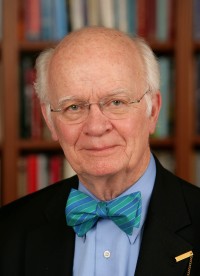Island spaces
Ile le petit Detroit, "Detroit Island," was our home for 11 summers. We and a dozen friends bought the better part of the island in 1970, and the Martys built a little home there and enjoyed it through 1981. After the death of my wife, cobuilder and mother of five cobuilders, we sold it for reasons of sentiment and practicality. I wrote books in that idyllic setting, using an old Underwood typewriter. When computers came along, it was impossible to use them on an island we had chosen because it did not have electricity (or running water and other amenities). Living the simple life was fine. But as anyone who uses a computer knows, the ability to type on an old typewriter without making endless errors quickly atrophies. At least mine did.
Then more people began buying and building homes on the island. While no one could see anyone else's cottage from his or her window, we pioneers got a sense not of "there goes the neighborhood," but of "it really is getting crowded around here."
After we sold our home, Christopher Lueking, son of Dean and Beverly Lueking, our closest friends throughout the years, came into the possession of a grand house on Washington Island, in whose Detroit Harbor our small island nestles. Washington Island does have electricity. I can process words there during the two-week spiritual retreats Dean and I now lead each summer.
Washington Island is six miles wide by five miles long. "Ravenwood," the Lueking house, is on the more wooded, less developed east side of the island. In the course of our stay the Martys and the Luekings drive all the roads and look out at all the bays. But many of the year-round residents find little reason to explore. The island has room and they let it be that way.
After church one Sunday we tried to describe where "Ravenwood" was to two older women from the island's west side. We described roads that had been cut through the woods decades earlier. We drew maps. Eventually it became clear to us that they had found no reason to go to the "east side" for, they reckoned, 18 or 20 years.
I thought about this recently when I read the following statistics in a little box in the Washington Island Observer. The island is 30 miles square and has a population of 650. Islanders are conscientious and protective zoners who keep their land from being misused, their landscape from becoming crowded and development from going awry.
Next to these population figures were the statistics for a smaller island. It has only 28 square miles but a population of 1,500,000. Its name is Manhattan. In other words, each Washington Islander, who feels a bit crowded as things are, would there have to share his space with 2,300 people.
The family member who noticed this information said, "Imagine how crowded the general store [the only place on Washington Island to buy groceries] would be if it had to serve 1,500,000 people."
Recalling how crowded Detroit Island came to seem and how dense the population on Washington Island's west side seems to locals helps me understand why the mayor of New York has to spend so much time urging the city's residents to be civil. We humans need our space, physical and psychic.
How near is your neighbor? And who is your neighbor? When the psychic neighborhood gets crowded, incivility becomes more understandable—and more dangerous. In the face of that, I'm ready some days to go back to the island porch and relearn to type.






